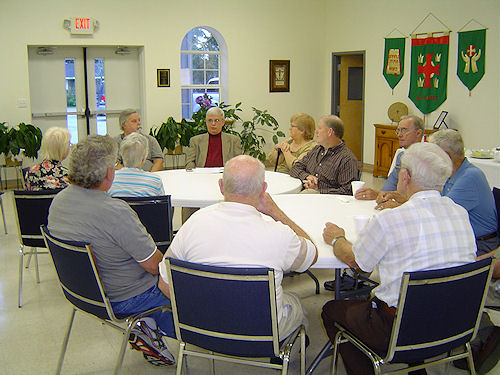"My father abused my mother and me, his oldest child," John Shivers began. "The damage was emotional, physical, financial, and spiritual. My brother, who was not physically abused, received the same emotional scars." The scars of domestic abuse, often not physically visible, are internal. In 2008 about three quarters of domestic abuse is witnessed by children who receive those scars. In Shivers' case, his home was dominated by a father who instilled no confidence in his children and who took out his rage on both wife and child. Shivers ultimately was thrown out of the house as a teen in one of those fits of rage. The scars from childhood continue to affect him long after he reached adulthood. He sought counseling at age 40 to deal with the ghosts of the past.

What kind of scars could be so devastating? Would you believe that it relates to an understanding that you are not loved, that you are not valued as a human being, that you are fearful of flashbacks when familiar situations remind you of abuse situations from the past? Those things do result in problems in the present, years later. Think of the person, for example, abused as a child who now uses the credit card to show value by purchasing things which never satisfy. Increasing debt reinforces the sense of despondency from youth!
"I'm still recovering," Shivers will tell you. The opportunity for recovery may not bring release. People just can't figure out the cause of parental abuse, and are left from childhood trying to second guess the abuser. Society often sees the abuser as benevolent based on behavior outside the home, and it may blame those who are abused at home for "smearing" the reputation of the abuser when abuse is reported. It is like blaming the victim for the perpetrator's crime against the victim!
"The key to breaking the chain of abuse from generation to generation in families, is altering the behavior of men," Shrivers explained. The emphasis in society is to "enable" women who are abused, but "women rebuking women or rebuking men just doesn't work," in Shivers' opinion. "It takes a man to rebuke a man for this kind of behavior." The behavior often is hidden at home and the world never sees what goes on behind closed doors. But male behavior often enables the abuse to continue, because there is such family shame in letting the outsiders know such a family secret.
There are concrete things our society can do to alter abusive behavior. It must begin with the workplace: 1) Employers must be willing to support wives of the abused, not just husbands. 2) Employers must support domestic abuse shelters. 3) Employers must educate themselves and their communities about the basic problem. Intervention strategies can work.
October is "National Domestic Violence Awareness Month" and John Shivers was "Men's 710" special guest for its October breakfast and speaker fellowship meeting at 7:10 AM at Zion Lutheran Church. John Shivers is an author and storyteller from north Georgia who was brought to Baldwin County by the Lighthouse and Baldwin County Library Coop. Besides writing books dealing with domestic abuse, Shivers edits a monthly coffee table magazine, "Georgia Mountain Laurel Magazine," and is involved in its production.
John Shivers may be contacted via his website:
John Shivers





